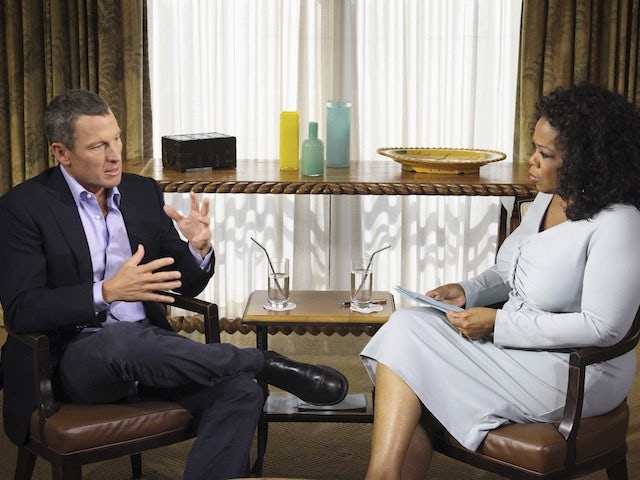Good evening and welcome to our coverage of the concluding half of
Lance Armstrong's visit to the confession booth. The programme begins in around half an hour.
Following yesterday's transmission, the reaction to Armstrong has remained fairly negative. Although he has admitted to cheating, his contrition has been questioned, while the World Anti-Doping Agency (WADA) have criticised him for failing to go into any significant detail about how he cheated.
While last night's show primarily dealt with what he did, tonight Oprah is expected to delve into the repercussions of his actions. She'll be quizzing Armstrong on how everyone reacted: his multimillion-dollar sponsors, his charity Livestrong, his mother and his children. Armstrong has five kids, the oldest of whom, Luke David, is 13 and had previously spoke out in defence of his father against the cheating claims.
For those unaware of the background, Livestrong is a charity set up by Armstrong in 1997 to provide support for cancer sufferers and their families. Armstrong successfully battled through an aggressive form of testicular cancer in 1996 when he was 25.
Today the organisation issued a statement saying that it was "disappointed" by the revelations. Armstrong, who fully resigned from Livestrong last November, apologised to the staff there earlier this week. In the statement, Livestrong said that it had "accepted" the apology and went on to "express our gratitude to Lance as a survivor for the drive, devotion and spirit he brought to serving cancer patients and the entire cancer community".
The major sponsor of Armstrong and his team during the height of his misdemeanours was the US Postal Service. Discovery Channel took over sponsorship of the team in 2004, a year before Armstrong announced his retirement.
In the wake of the revelations, Armstrong is expected to face lawsuits from many disgruntled organisations - and US Postal Service, which is funded by the government, is reported to be among them. In tonight's interview Armstrong is expected to be quizzed about how he intends to deal with the queue of angry parties.
It's interesting to note that Armstrong's
official website opens with a large picture of him
running.
Among the more light-hearted news items relating to Armstrong today was the news that
his story could be turned into a movie by
Lost creator JJ Abrams. I'm predicting a scene where a drugged-up Lance is encouraged to ENTER THE NUMBERS.
Eyes down, look in as the programme gets underway.
Does he feel 'disgraced'? "Of course. But I also feel humbled. I feel ashamed. This is ugly stuff."
What was the most humbling moment? "I believe it was a Wednesday, Nike called. They said basically that they're out. Then the calls started coming in. Everybody out. Not a fun period. In a way I just assumed we'd get to that point. The story was getting out of control. The one person I didn't think would leave was the Foundation (Livestrong)."
"That was the most humbling moment. To get that call - two parts. One, step down as chairman but stay on the board, stay involved. That wasn't enough. For the people, our supporters, and then a couple weeks later the next call came. And 'we need you to step aside'. I don't think it was 'we need you to step down', it was 'we need you to consider stepping down for yourself'. I had to think about that a lot. The Foundation is like my sixth child and to make that decision to step aside was... that was big."
They made it for you? "I was aware of the pressure. I wouldn't say forced out. I had interactions with some of the board members. It was the best thing for the organisation but it hurt like hell. That was the lowest."
Are you facing your demons? "Absolutely. Absolutely. It's a process. I think we're at the beginning of the process now."
Does he think banned substances contributed to him getting cancer? "I don't think so. I'm not a doctor, I've never had a doctor suggest that to me personally. But I don't believe so."
Armstrong is confronted with a video from the SCA deposition in 2005 where he insisted if he had doped he would lose all of his contracts. 'Don't think for a second I don't understand that,' he said at the time. 'It's not about money for me.'
"That's sick. I don't like that. I don't like that guy."
"That is a guy who felt invincible, was told he was invincible, truly felt invincible. That guy's still there. I'm not going to lie to you or the public. He's still there. Does he need to be exiting through this process? Yes. Am I committed to this process? Yes. We talked about apologies, and I owe a lot of people apologies. People by name."
Does he owe David Walsh an apology? "I would apologise to David."
What would he say to the millions of people who believed? "I say 'I understand your anger, your sense of betrayal. You supported me forever through all of this, you believed, and I lied to you. And I'm sorry.' I will spend as long as I have to to make amends, knowing full well that I won't get many back."
"If you're asking me do I want to compete again? The answer's 'hell yes'. I've been a competitor all my life. I don't expect it to happen. Not the Tour de France. With this penalty and this punishment, if there was ever a window - would I like to run the Chicago Marathon when I'm 50? I'd love to, but I can't."
"I'd love the opportunity to be able to compete, but this isn't the reason I'm doing this. This may not be the most popular answer, but I think I deserve it. When you look at the culture and what everyone else got [as punishment] - you're trading my story for a six-month suspension? I got the death penalty. I'm not saying that's unfair necessarily, but it's different."
"I deserve to be punished. I'm not sure I deserve a death penalty."
Just weeks after being stripped of his Tour de France titles, he tweeted a picture of himself surrounded by the jerseys. "Yeah, that was another mistake. That was just more defiance. What's scary is I actually thought it was a good idea at the time."
How has it changed the way he sees himself? Has it? "Not completely. This is heavy. This is messy and not something I can sit with you and then leave and [be okay]. Yes [I'm doing therapy]. Over my life I've done it sporadically. This is going to be a long process."
Do you have remorse? "Erm. I am only starting - and I will continue pursuing this... there are people still sitting there today that are true believers. Do I have remorse? Absolutely. Will it grow? Absolutely. For me this is just the first steps. These are my actions. I'm paying the price but I deserve it."
Has there been a change within him? "I'd be lying if I said that it has. Again, I keep going to this idea of process. I've got work to do. I can't... there's not going to be one tectonic shift here that says that's good enough."
Did anyone close to him want him to stop? "Of course." Could anyone have stopped him? "Probably not."
Of his ex-wife Kristin: "She is a smart lady, extremely spiritual. She believes in honesty and integrity and truth. We believe differently in a lot of things. We have three kids together, they deserve the honest truth. They deserve a dad that is viewed as telling the truth to them and the public."
Had she told him to stop? "I asked her the other day 'if this comes up, can I talk about this?' She said yes. She was not that curious. Perhaps she didn't want to know. I guess maybe I protected her a little bit from that. The thing about her and my doping and this comeback, she was the one person I asked if I could do that. I needed her blessing. She said to me 'you can do it, under one condition, that you never cross that line again'. I said 'you got a deal' and I would have never betrayed that with her. It was a serious ask, a serious commitment, she gave me her blessing. I gave her my word and I did stick to it."
Did he expect to win without doping? "Yes, because I thought and I still think that the sport was very clean. There really was a mid shift in the mid-2000s with the bio passport."
How did it feel coming third? "I didn't expect to get third, I expected to win and at the end to myself 'I just got beat by two guys that were better'. I know that doesn't sound like something I'd say but I did the training, I got beat."
How much do the kids know? "They know a lot. They hear it in the hallways. Their schools and their classmates have been very supportive. When you lose control is when your kids go out of that space - Facebook and Twitter - and then the feedback comes."
Armstrong recalls seeing his son defend him against the allegations. He appears emotional. "That's when I knew I had to tell him. He's never asked me. He trusted me. And I heard about it in the hallways."
"At that time I didn't say anything, but that's when I knew I had to say something. I decided 'this is out of control'. Then I had to have that talk with him, which was over the holidays. I said 'listen there's been a lot of questions about your dad, about my career and whether I've doped. I've always been defiant about that and you guys have trusted me'. I said 'I want you to know that it's true'. There was the twin girls, who are 11, and Luke. They didn't say much. They just accepted it."
"I told Luke, 'Don't defend me any more. Don't.'"
How did he take it? "He's been remarkably calm and mature about this. I said 'if anyone says anything to you, some kid says something, do not defend me, just say 'hey, my dad says he's sorry'.' He said 'okay. I love you, you're my dad. This won't change that.' I had expected... something."
Did he expect anger or disappointment? "Thank God he's more like Kristin than he is like me."
Hoping his lifetime ban from competition will be lifted? "Selfishly yes, but realistically I don't think that's going to happen. I have to live with that."
Intention of doing this interview? "The biggest hope and intention was the wellbeing of my children. The older kids need to not be living with this issue in their lives. That isn't fair for me to have done it to them. Also the little ones, they're two and three, they have no idea but they will learn it. This conversation will live forever. That dumb tweet with the yellow jerseys will live for ever. I've got to get this conversation right for them as they enter the depth of their lives."
Was he trying to pay off USADA with a $150k donation? "That is not true. In their 1000-page decision, everything was in there, but that wasn't. Why wasn't it? Pretty big story. It's not true."
What has been the financial cost? Lost everything? "I've certainly lost all future income. You could look at those two days where people left. I don't like thinking about it, but that was a $75 million day. Gone. And probably never coming back."
Was he ever in a position of not wanting to get out of bed? "I've been to a dark place that was not my doing, where I didn't know if I was going to live a month, a year. It's helped me now. This is not a good time but it isn't the worst part of my life. You cannot compare this to an advanced diagnosis or 50-50 odds. That sets the bar. It's close but I'm an optimist and I like to look forward. This has caused me to look back. My mom and I never look back, I've never asked her about my biological father, we don't go there."
How is she handling it? "She's a wreck. She's not the kind of person that would call me up and say 'Lance I'm a wreck' but my step-father called me up and said 'she's having a tough time'. It took seeing her to really understand this has taken a toll on her life."
Is he now in a space to not just apologise but feel how he affected others? "Yeah. Yeah, yeah. And I don't need to be back in that place where I can take things for granted, abuse privilege. If I had one of my kids act like that, I'd be apoplectic."
Will he rise again? "I don't know. I don't know what's out there. I do not know the outcome here. I'm getting comfortable with that. That would have driven me crazy in the past. I dunno. I'm deeply sorry for what I did. I can say that a thousand times and it might never be enough to get me to come back."
Is he a better human being? "Without a doubt. Again, this happened twice in my life. When I was diagnosed, I was a better human being after that. Then I lost my way. Here's the second time. It's easy to sit here and say 'I feel like a better man today', buit I can't lose my way again. I'm not in a position to make promises. The biggest challenge in the rest of my life is to not slip up again and lose sight of what I want to do. I had it, and then things got too big, too crazy. So, epic challenge."
Is there a moral to the story? "I don't have a great answer. I can look at what I did - cheating, lying about it, bullying people - of course you're not supposed to do that, that's what we teach our kids. There's another moral to it - getting caught up in that ride and doing all those things along the way. The ultimate crime is the betrayal of these people who believed in me and supported me."
Oprah ends by saying that she hopes that the moral is what his ex-wife told him in 2003: 'The truth will set you free.' They shake hands, thank each other and the credits roll.
With that, our coverage comes to a close. Be sure to stick with Sports Mole over the coming days for all of the fallout to Armstrong's latest comments. Good night!









